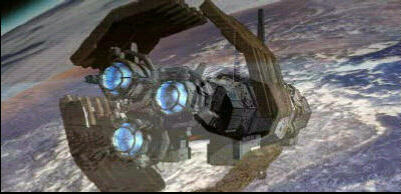Thursday 7 June 2001

|
Pic of the day: Mankind's future in space ... according to the strategy game Alpha Centauri, which also features telepathic alien worms and disembodied human minds. Science FantasyGenerally there is assumed to be two different genres of speculative fiction: Science Fiction and Fantasy. Some books are rather clearly one or another. Basically, anything set in outer space or the near future is supposed to be Science Fiction. Anything involving sorcerers or werewolves is supposed to be Fantasy. Dragons too, until some years ago. Anne McCaffrey is perhaps most famous for her many books about the "Dragonriders of Pern", with their domesticated dragons. Where dragons had traditionally been scary and chaotic, if not downright evil, these dragons were still impressive but rather nice. Like huge horses with superpowers rather than demonic engines of destruction. Intriguingly, the framework for the Pern books is classic Science Fiction. A small colony of humans land on a habitable planet which just happens to already have some native life reasonably compatible with earth life. They start with a high technology, enough so to genetically modify the local fauna and so create the first Dragons. Then it all quickly degenerates to a more medieval level, and voila: Instant Fantasy. Science Fantasy. Another series of McCaffreys details the interplanetary adventures of a family of telepaths and telekinetics. This is certainly not a first. Psionic powers of various kinds are fairly common in supposed Science Fiction, even though the scientific rationale for them is hard to come by. It certainly looks more like magic to me, except psi people tend to wear coverall instead of robes. Unless they just conveniently happen to be aliens, which presumably explains anything. Arthur C Clarke famously claimed that any sufficiently advanced technology would be indistinguishable from magic. There have been various conjugations of this later, such as "any technology that is distinguishable from magic is insufficiently advanced". Perhaps the best so far is by Mark Stanley when he lets his character Florence Ambrose write on a wall: "Any technology, no matter how primitive, is magic to those who don't understand it." But I say unto y'all: Any sufficiently researched magic is indistinguishable from technology. This is my only explanation why telepathy and even telekinesis is quite common in typical Science Fiction settings. ***No mention of these topics would be complete without me heaping scorn on the glory of nanotechnology. As seen by its proponents, who allegedly believe it to be feasible, nanotech will be able to nearly instantly transform one object into another by rearranging the molecules or atoms into the desired pattern. Most importantly, extremely small robots working collectively ("nanobots") will be able to do miracles in the human body. Otherwise sane people believe that it is theoretically possible for tiny robots to not just seek out and destroy cancer cells, but even detect replication errors in the DNA and repair it before the bad stuff bears fruit. And should you be so unlucky as to fall and break a leg, the nanobots will make it good as new in a matter of minutes at best. Oh yeah baby. You try that and I'll try a healing spell, let's see who finishes first. And just in case the worst should happen, the nanobots have scanned your whole brain, every little synapse, storing all your memories and your attitude and all that is you, uploading it all to a remote computer. Without disrupting the function of the brain for a moment, of course. Yeah, right. Bring on the resurrect spell already. Sure, it makes for a good role playing game, but it's not science fiction. It is "science" fantasy. ***This is not to say that I think tomorrow will be like today. If we don't accidentally create a tiny black hole that eats our entire planet (which is a quite real possibility by 2005) we are likely to see lots of changes. And some of them may indeed look like magic to us. Then again, tax return seems like magic to many people today, especially among the elderly. When I was 20, which is now 22 years ago, I programmed a small calculator to calculate taxes. It wasn't worse than that. And still people seem to regard it as something that is utterly in the hands of God or Fate, certainly nothing they can know or do anything about. I've already mentioned the people who call me, hear me tell them politely that they have called a wrong number, and then proceed to ask for the person they wanted to call. Indistinguishable from magic indeed. A common telephone. And I won't go into the way some of my coworkers approach our computers at work. It would have made no difference if it had indeed been a crystal ball, or so it seems to me. And then I remind myself that if I am blessed with a long life, the time will quite likely come when I look at a very ordinary part of daily life, and understand nothing. "There is no steering wheel. I just tell it where I want it to go, and it drives there by itself." "But how can you trust a machine like that?" "How could you trust people to drive, when they died like flies trying?" But of course, that may just be one of my science fantasies. (This entry was in part inspired by an entry in Al Schroeder's Nova Notes. Though I have taken a rather different approach, I think.) |
Another cold day, and some rain. |
Yesterday <-- This month --> Tomorrow?
One year ago
Two years ago